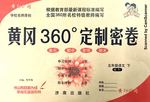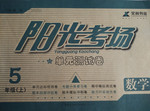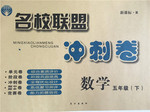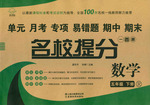题目内容
3.Don't respond to any e-mails ______ personal information,no matter how official they look.( )| A. | requested | B. | request | C. | requesting | D. | to be requested |
分析 不要回复任何要求私人信息的邮件,无论它们看起来多么正式.
解答 答案:根据句子结构Don't respond to (谓语)any e-mails (宾语)______ personal information(定语),可以看出要用request 的非谓语动词,又因为request personal information 和any e-mails 之间是主动关系,所以选择C requesting,其他选项不符合这个结构,A表示被动;B做谓语;D表示将要被做.
点评 考查现在分词做定语.
现在分词和过去分词在句中都可以作定语,但在语态和时间概念上有区别,在语态上,现在分词表主动,过去分词表被动,在时间上,现在分词表示动作正在进行,而过去分词则
表示动作完成.

练习册系列答案
 黄冈360度定制密卷系列答案
黄冈360度定制密卷系列答案 阳光考场单元测试卷系列答案
阳光考场单元测试卷系列答案 名校联盟冲刺卷系列答案
名校联盟冲刺卷系列答案 名校提分一卷通系列答案
名校提分一卷通系列答案
相关题目
14.My son Joey was born with badly twisted (11)D.The doctors assured us that with treatment he would be able to walk (12)Cbut would never run very well.The first three years of his life were spent in (13)A.casts and braces.By the time he was eight,you wouldn't know he had a problem when you saw him (14)B.The children in our neighborhood ran around as most children do during (15)D,and Joey would jump right in and run and play,too.We (16)Atold him that he probably wouldn't be able to (17)D as well as the other children.So he didn't know.
In seventh grade he decided to (18)B for the cross-country team.Every day he (19)A with the team.He worked harder and ran more than any of the others-four to five miles a day~~perhaps he sensed that the (20)B that seemed to come naturally to so many others did not come naturally to him.Although the entire team runs,only the (21)Cseven runners have the potential to score points for the (22)C.We didn't tell him he probably would never make the team,so he didn't know.
He (23)Dto run four to five miles a day.Every day (24)D the day he had a 103-degree fever.I was (25)B.So I went to look for him after school.I found him running all alone.The sweat ran down his face and his eyes were glassy (呆滞)from his (26)C.Yet he looked straight ahead and (27)A running.We never told him he couldn't run four miles with a 103-degree fever.So he didn't know.
Two weeks later,the names of the team runners were (28)A.Joey was number six on the (29)C.Joey had made the team.He was in seventh grade-the other six team members were all eighth-graders.We never told him he shouldn't (30)B to make the team.We never told him he couldn't do it We never told him he couldn't do it…so he didn't know.He just did it.
In seventh grade he decided to (18)B for the cross-country team.Every day he (19)A with the team.He worked harder and ran more than any of the others-four to five miles a day~~perhaps he sensed that the (20)B that seemed to come naturally to so many others did not come naturally to him.Although the entire team runs,only the (21)Cseven runners have the potential to score points for the (22)C.We didn't tell him he probably would never make the team,so he didn't know.
He (23)Dto run four to five miles a day.Every day (24)D the day he had a 103-degree fever.I was (25)B.So I went to look for him after school.I found him running all alone.The sweat ran down his face and his eyes were glassy (呆滞)from his (26)C.Yet he looked straight ahead and (27)A running.We never told him he couldn't run four miles with a 103-degree fever.So he didn't know.
Two weeks later,the names of the team runners were (28)A.Joey was number six on the (29)C.Joey had made the team.He was in seventh grade-the other six team members were all eighth-graders.We never told him he shouldn't (30)B to make the team.We never told him he couldn't do it We never told him he couldn't do it…so he didn't know.He just did it.
| 11.A.hands | B.mouth | C.body | D.feet |
| 12.A.freely | B.fluently | C.normally | D.strangely |
| 13.A.treatment | B.school | C.dark | D.silence |
| 14.A.study | B.walk | C.read | D.stand |
| 15.A.holiday | B.rest | C.winter | D.play |
| 16.A.never | B.often | C.always | D.still |
| 17.A.talk | B.study | C.read | D.run |
| 18.A.break out | B.go out | C.give out | D.run out |
| 19.A.trained | B.struggled | C.fight | D.study |
| 20.A.scores | B.abilities | C.standards | D.dreams |
| 21.A.last | B.strongest | C.top | D.number |
| 22.A.family | B.country | C.school | D.grade |
| 23.A.started | B.refused | C.liked | D.continued |
| 24.A.though | B.still | C.then | D.even |
| 25.A.surprised | B.worried | C.sad | D.nervous |
| 26.A.running | B.sweat | C.fever | D.feet |
| 27.A.kept | B.stopped | C.began | D.forgot |
| 28.A.called | B.made | C.spelt | D.read |
| 29.A.ground | B.team | C.list | D.wall |
| 30.A.decide | B.expect | C.promise | D.refuse |
11.It was a very foggy day in London.The fog was so thick that it was impossible to see more than a foot or so.(11)C,cars and taxis were not able to run and were standing by the side of the road.People were trying to(12)A their way about on foot but were losing their way in the fog.
Mr.Smith had a very important (13)C at the House of Commons and had to get there but no one could take him.He tried to walk there(14)B found he was quite lost.Suddenly he bumped into a stranger.The stranger asked if he could help him.
Mr.Smith said he(15)D to get to the Houses of Parliament.The stranger told him he would take him there.Mr.Smith(16)B him and they started to walk there.The fog was getting thicker every minute but the stranger had no(17)A in finding the way.He went along one street,turned down(18)A,crossed a square and at last after about half an hour's(19)D they arrived at the Houses of Parliament.Mr.Smith couldn't understand how the stranger found his way.
"It is wonderful,"he said."How do you find the way in this fog?"
"It is no trouble at all to me,"said the stranger,"I am(20)B."
Mr.Smith had a very important (13)C at the House of Commons and had to get there but no one could take him.He tried to walk there(14)B found he was quite lost.Suddenly he bumped into a stranger.The stranger asked if he could help him.
Mr.Smith said he(15)D to get to the Houses of Parliament.The stranger told him he would take him there.Mr.Smith(16)B him and they started to walk there.The fog was getting thicker every minute but the stranger had no(17)A in finding the way.He went along one street,turned down(18)A,crossed a square and at last after about half an hour's(19)D they arrived at the Houses of Parliament.Mr.Smith couldn't understand how the stranger found his way.
"It is wonderful,"he said."How do you find the way in this fog?"
"It is no trouble at all to me,"said the stranger,"I am(20)B."
| 11.A.Planes | B.Ships | C.Buses | D.Trains |
| 12.A.find | B.push | C.lose | D.force |
| 13.A.committee | B.pattern | C.meeting | D.holiday |
| 14.A.so | B.but | C.therefore | D.and |
| 15.A.wondered | B.promised | C.admitted | D.wanted |
| 16.A.paid | B.thanked | C.observed | D.doubted |
| 17.A.difficulty | B.interest | C.delight | D.surprise |
| 18.A.another | B.other | C.one | D.the other |
| 19.A.ride | B.work | C.drive | D.walk |
| 20.A.deaf | B.blind | C.clever | D.lucky |
8.-Have you seen Jack recently?
-No.He for another company now.( )
-No.He for another company now.( )
| A. | is working | B. | had worked | C. | worked | D. | was working |
15.Mr.Black must be worried about something; you can it from the look on his face.( )
| A. | react | B. | read | C. | recognize | D. | realize |